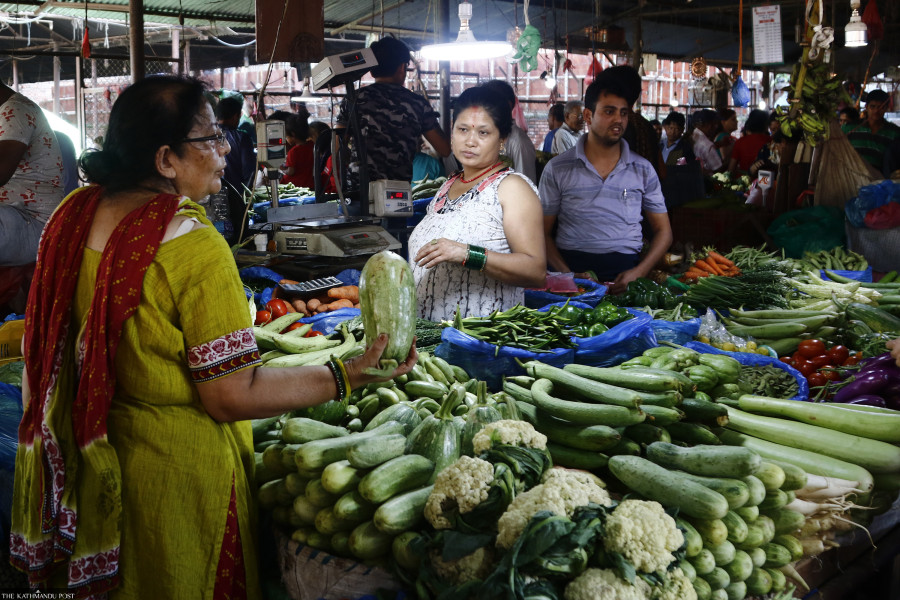Money
Supply chain goes haywire as incessant rain soaks country
Vegetable prices soar with start of festival season while traders blame shortages as usual.
Krishana Prasain
Disruptions to the supply chain caused by landslides and floods due to incessant rain in various parts of the country has made vegetables dearer in the valley’s wholesale and retail markets, traders said on Friday.
Sellers of fresh produce said prices would rise further as the lockdown has been eased and the festival season has begun. If the rains continue, higher freight charges will make vegetables even more expensive, they said.
Binaya Shrestha, deputy director of the Kalimati Fruits and Vegetable Market Development Board, said that falling production of seasonal vegetables and swelling festival demand would keep prices on the high side until the next harvest season.
It is highly likely that prices will go up in the next few days as the lockdown has been eased, which will push up demand after long closed businesses reopen, he added.
Besides demand and supply, weather and transportation cause vegetable prices to fluctuate widely, traders said.
Wholesale prices of yard-long beans are now in the range of Rs90-100 per kg while in normal circumstances at this time of the year, they would cost Rs40-50 a kg. The current retail price of yard-long beans is Rs170-180 per kg.
When roads become impassable due to landslides, vegetable shipments are stranded on the way; and in the rainy season, they start to rot fast. This leads to shortages of inventory and consequent higher prices, traders said.
Shrestha said that the supply situation had improved as the market received around 600-700 tonnes of vegetables on Thursday and Friday. But most of the fresh produce arrived in a damaged state, he said.
Barely 300-400 tonnes of vegetables were being delivered to the Kalimati Fruits and Vegetable Market daily in the past few days, he said.
Trucks carrying vegetables take 9-10 days to arrive in Kathmandu because of the landslides in different places on the highway.
Traders attributed the recent rise in prices to the upcoming festival season, but they claimed that wholesale prices were down by 15-20 percent compared to last year.
Bijay KC, president of the Kalanki Vegetable Market which contains 115 stalls, confirmed that seasonal vegetables such as yard-long beans, okra, sponge gourd, snake gourd, bitter gourd, green pumpkin, makai bodi and cucumber, among others, had become more expensive.
It has been around 10 days since vegetable prices increased by around 10-12 percent, he said.
“Observing the festival demand, farmers have raised the field price of vegetables,” he said. "Even though consumption is less than what it used to be before the Covid-19 pandemic, sales are slightly higher compared to the festival season last year."
KC added that the production period of seasonal produce was coming to an end in vegetable heartlands like Dhading and Panchkhal, which means a drop in shipments to the valley.
Seasonal vegetables come to the valley mainly from Dhading, Kabhre, Nuwakot, Panchkhal, Makwanpur, Chitwan, Sarlahi, Bara and Parsa.
“Normally, wholesale prices of seasonal vegetables used to range from Rs40-50 per kg,” Shrestha said.
Consumers are complaining about the rise in the price of vegetables, especially with festivals like Father’s Day and Teej approaching when consumption increases, insiders said.
“Today I paid Rs110 per kg for okra and Rs130 per kg for sponge gourd. This is outrageous as around a fortnight ago I bought these vegetables for Rs50 and Rs40 per kg, respectively,” said Tokha resident Raj Kumar Lamichhane.
“What other vegetable to buy when bottle gourd is priced at Rs105 per kg?” he asked. "The festival season is nearing, and such steep increases in vegetable prices will push up our festival expenses because food is a major part of the celebrations."
Lamichhane added that not only had vegetables become dearer but also hard to come by.
The country’s vegetable import bill reached Rs15.27 billion in the last fiscal year 2020-21, up 12.5 percent compared to the previous fiscal year 2019-20 when imports amounted to Rs13.58 billion, according to the macro economic data of Nepal Rastra Bank.




 21.12°C Kathmandu
21.12°C Kathmandu













